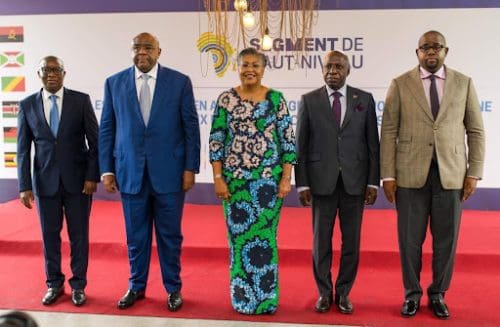
The Democratic Republic of Congo mobilized over 250 officials, business leaders, and international partners in Kinshasa on November 18 for a high-level forum on regional economic integration, building on commitments made during the 9th Ordinary Summit of the International Conference on the Great Lakes Region (ICGLR).
Prime Minister Judith Suminwa Tuluka opened the daylong gathering by calling for a new narrative centered on concrete action, sincere cooperation, and shared development. She emphasized that lasting peace depends directly on collective investment in infrastructure, employment, trade, and mutual trust across member states.
Suminwa stressed the DRC’s ambition to become an integrating state positioned at the intersection of several regional economic communities. The country currently holds the ICGLR chairmanship following the summit held three days earlier at Palais du Peuple, where President Félix-Antoine Tshisekedi Tshilombo assumed leadership from Angola.
The forum participants focused discussions on three major infrastructure corridors designed to transform regional connectivity. The Lobito Corridor will link the DRC, Zambia, and Angola to the Atlantic Ocean, easing logistical and mining flows that have long faced transportation bottlenecks.
A Tanzania-Burundi-DRC railway corridor promises to open strategic routes to the Indian Ocean and new markets, while the DRC-Uganda road corridor aims to transform sensitive border zones into areas of shared prosperity. These projects represent practical applications of economic diplomacy as a tool for peace.
Sector ministers, leaders of regional institutions, development banks, international experts, and private sector representatives underscored the need for stronger coordination among existing regional integration frameworks. Several speakers highlighted the importance of harmonizing policies and avoiding institutional duplication to enhance effectiveness and better serve local populations.
Minister of Regional Integration Floribert Anzuluni closed the meeting with a call for sustained collective momentum. He cautioned against allowing the initiative to become merely a talk show with no follow through, insisting on rigorous monitoring and strong networks to translate commitments into concrete results.
Anzuluni announced the DRC’s intention to institutionalize this gathering and prepare a second edition, signaling long term commitment to the economic integration agenda. His ministry jointly organized the forum with the Public-Private Partnership Council and Coordination Unit.
Diplomatic exchanges reaffirmed the crucial role of regional partners including the African Union, European Union, United Nations, and various regional economic communities in supporting states toward more coherent integration. Participants agreed that economic diplomacy now serves as one of the most effective levers for durable stability.
The approach rests on cross border economic incentives, mobility, and complementarity between public and private investment. World Bank Country Director Albert Zeufack attended alongside other development partners committed to financing transformational infrastructure.
Angola’s Foreign Affairs Minister Téte António participated in his capacity as outgoing ICGLR Regional Inter-Ministerial Committee chairperson, officially handing over responsibilities to Anzuluni during summit proceedings. Transport Deputy Prime Minister Jean-Pierre Bemba also attended the economic forum.
The summit itself attracted five heads of state from Angola, Burundi, Central African Republic, DRC, and Republic of Congo, with Uganda represented by Minister of State for Defence Huda Oleru. The gathering marked the first in-person leaders’ meeting in five years following a virtual summit in 2020.
The summit appointed Dr. Mubita Luwabelwa from Zambia as new Executive Secretary, replacing Ambassador João Caholo of Angola. Leaders later produced the Kinshasa Declaration outlining a unified framework for advancing peace and security.
Ministers of Defence from member states met separately to deliberate on regional security priorities, while mining ministers reaffirmed commitments to responsible governance of mineral resources. Those discussions highlighted persistent links between illegal mining and insecurity, particularly in eastern DRC and Sudan.
The economic integration forum confirmed that the Great Lakes Region possesses tools needed to turn its potential into shared prosperity. Organizers framed the gathering as an important step in consolidating peace built not only on political dialogue but also on economic integration, trust, and concrete outcomes.
The ICGLR membership includes Angola, Burundi, Central African Republic, Republic of Congo, Democratic Republic of Congo, Kenya, Rwanda, Sudan, South Sudan, Tanzania, Uganda, and Zambia. These twelve nations share borders around Africa’s Great Lakes and face common security and development challenges.
